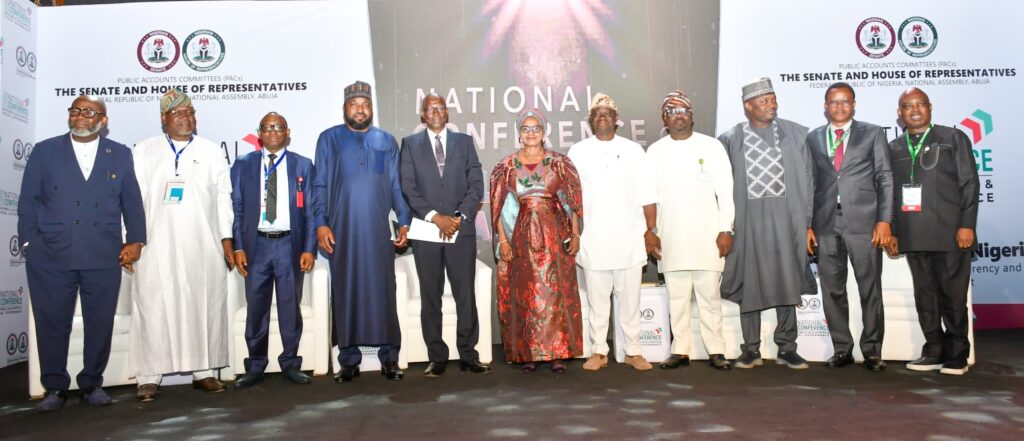The Independent Corrupt Practices and Other Related Offences Commission (ICPC) has accused revenue generating agencies of operate with impunity and treating public funds as personal property.
He urged the National Assembly to intensify its oversight functions on such agencies for enhanced transparency.
Speaking at the 2025 National Conference on Public Accounts and Fiscal Governance organised by the Senate and House of Representatives Public Accounts Committees in Abuja on Wednesday, the ICPC Chairman, Dr. Musa Aliyu, said stronger legislative scrutiny is needed to ensure that all revenues collected by these agencies are duly remitted to the national coffers.
“You see, the funny thing is that these revenue-generating agencies believe the money is their own. But unfortunately, it’s not theirs. So please, intensify oversight so they’ll be held accountable and bring to the table whatever they collect,” he said.
Represented by the Director of Finance, Akporo Michael, he declared support for the fiscal policy reforms of the present administration, particularly the recent tax legislation signed into law, which he said would reposition Nigeria’s fiscal framework and significantly boost revenue mobilisation.
“For the first time in our history, the government has taken the bull by the horns by reforming our tax system. These reforms aim to increase our tax-to-GDP ratio to between 18% and 20% in the coming years.”
He said Nigeria’s low tax-to-GDP ratio of 7.8 percent is among the lowest in sub-Saharan Africa. In contrast, countries like Kenya, South Africa, and Egypt are recording double-digit ratios and reaping the benefits in infrastructural development and service delivery, he said.
“Our budget implementation suffers every year because we do not mobilise enough revenue. Contractors in my office have been waiting for payment since last year. It is time to close the gaps,” he said.
He decried the opacity of the Nigeria National Petroleum Corporation.
“Around the world, Saudi Arabia—their national oil company in the year 2024 posted a profit of $106.25 billion net profit. Around the same year, you can do a good mix. Our NNPC—how much did it post? $2.4 billion profit in 2024.
“These are the same players in the same league. Granted, Aramco’s capacity is higher than that of NNPC. Their production on a daily basis is 9.1 million barrels per day, while Nigeria in 2024 was doing 1.3. We agree. So let’s assume that Aramco is producing oil 10 times that of Nigeria.
“And they made a profit of $106 billion. If their capacity is more than just 10 times, what should be our own net profit? At least 10% of theirs. But we got only 2.4%.”
He also called for the overhaul of Nigeria’s public sector salary structure, which he described as unjust and demoralising.
He urged the National Assembly to engage the Salaries and Wages Commission and harmonise pay scales in a way that reflects fairness, justice, and economic reality.
While applauding recent gains in Nigeria’s global corruption ranking, the EFCC official warned that the fight is far from over. He reminded the audience of Nigeria’s past designation as one of the world’s most corrupt countries by Transparency International and cautioned against complacency.
“We’ve improved, but we’re still not where we should be. Out of 140 countries ranked by Transparency International in 2024, Nigeria is still behind 100. That means only 40 countries are below us,” he said.
He linked widespread corruption to poor accountability, misuse of public office, weak sanctions, and a lack of transparency in governance.
He argued that corruption has led to a trust deficit between citizens and government and scared away investors.
To close leakages and enhance transparency, he advocated for the digitisation of key government processes, including payroll, procurement, and revenue collection.
He cited the successes of the Integrated Payroll and Personnel Information System (IPPIS), which helped the EFCC recover ₦21 billion in salary fraud in a single investigation.
“If we digitise our systems and eliminate human discretion, we will cut out most of the corruption,” he said, referencing international examples like Bulgaria, where procurement processes are fully transparent and publicly accessible.
He also called on lawmakers to pass a comprehensive whistleblower protection law, describing it as a vital tool to encourage citizen reporting of corruption.
In addition, he called for the establishment of special anti-corruption courts through constitutional amendment to speed up justice in corruption-related cases.
He recounted how some EFCC cases from as far back as 2006 had yet to secure convictions due to endless adjournments and changes in judges.
He warned that Nigeria’s continued survival depends on the outcome of the anti-corruption fight.
Also speaking at the event,the governor of the Central Bank of Nigeria (CBN), Olayemi Cardoso, called for greater synergy between monetary and fiscal authorities to enhance Nigeria’s macroeconomic stability and ensure sustained national development.
Cardoso, who was represented at the National Conference on Public Accounts and Fiscal Governance by a senior CBN official, reaffirmed that the roles of both the Central Bank and fiscal authorities were not at odds, contrary to popular opinion.
He said while the fiscal authorities focus on revenue generation and development, the CBN’s primary mandate is to ensure that fiscal actions do not destabilise the economy.
“Contrary to the general belief, the Central Bank and fiscal authorities are not working at cross purposes. They may appear to have different tools, but both are focused on achieving the same goals: economic growth, stability, and improved welfare for Nigerians,” he said.
Cardoso noted that one of the CBN’s central concerns is to balance government spending with the need to maintain macroeconomic stability, especially in areas like inflation, exchange rate management, and the strength of the naira.
He highlighted that since the inauguration of the current management at the CBN, the bank has adopted a proactive approach to both global and domestic economic developments.
He cited the minimal impact of recent geopolitical tensions as proof of this shift in strategy.
“We don’t sit and wait for events to occur. That’s why even recent global disruptions have had minimal impact on Nigeria’s economy,” he said.















